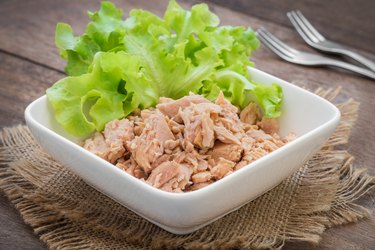
Many people include tuna in their diets. It provides high quality protein, and it is rich in niacin, vitamins B-6 and B-12 and selenium. You need to get fiber in your diet, too. While tuna itself does not provide you with this nutrient, it is possible to take in fiber while eating tuna.
Fiber and Tuna
Video of the Day
Tuna's macronutrient content primarily comes from protein and fat instead of carbohydrates and fiber. However, tuna fish salad recipes often incorporate diced onion, which contributes 0.2 g of fiber per tablespoon. Two slices of whole grain bread in your tuna sandwich adds 8 g of fiber. You should include 25 to 38 g of fiber each day, although your fiber needs decrease after you turn 51. Older adults require 21 to 30 g daily.
Video of the Day
Digestive Health Benefits
The fiber you get by consuming a tuna sandwich or eating fiber-rich side dishes with tuna steaks is important for your digestive system health. Fiber regulates your bowel movements, which helps prevent diarrhea and constipation. It also may prevent diverticulitis, a condition marked by inflamed pouches on the colon. Approximately half of Americans between the ages of 60 and 80 years of age will develop colon pouches, and 10 to 15 percent of those will get diverticulitis, or inflamed pouches, according to the BJC Health Care website.
Tuna, Fiber and Weight Loss
The fiber in your diet, whether it comes from tuna dishes or not, may help you lose weight. It takes up space in the stomach, which helps you feel fuller for longer and thus take in fewer calories. Tuna by itself is a good option for weight loss as well due to its protein content. A study published in the April 2011 issue of the "Nutrition Journal" notes that high protein diets are more effective for weight loss than high fiber diets. Tuna is also low in calories, with 109 calories per 3-oz. serving.
Considerations
When eating tuna combined with fiber from bread, noodles or vegetables, there are two main concerns: intestinal gas and mercury contamination. If you go from eating a diet low in fiber to a high fiber diet without adding fiber gradually, you risk developing intestinal gas that can trigger stomach bloating, flatulence or belching. Ahi and bigeye tuna are quite high in mercury, so limit consumption, especially if you are pregnant. Consume canned or yellowfin tuna no more than a few times each month; limit yourself to three 6-oz. servings. The mercury in tuna can cause nervous system problems.
- USDA National Nutrient Database: Fish, Tuna, White, Canned in Water, Without Salt, Drained Solids
- Fitbit: Whole Grain Bread, 100% Whole Wheat
- MayoClinic.com: Dietary Fiber: Essential For a Healthy Diet; November 2009
- BJC HealthCare: Fiber and Bowel Health
- "Nutrition Journal"; Comparison of High Protein and High Fiber Weight-Loss Diets in Women With Risk Factors for the Metabolic Syndrome; L.A. Te Morenga, et al.; April 2011
- American Pregnancy Association; Mercury Levels in Fish; March 2011
- U.S. Environmental Protection Agency: What You Need to Know about Mercury in Fish and Shellfish